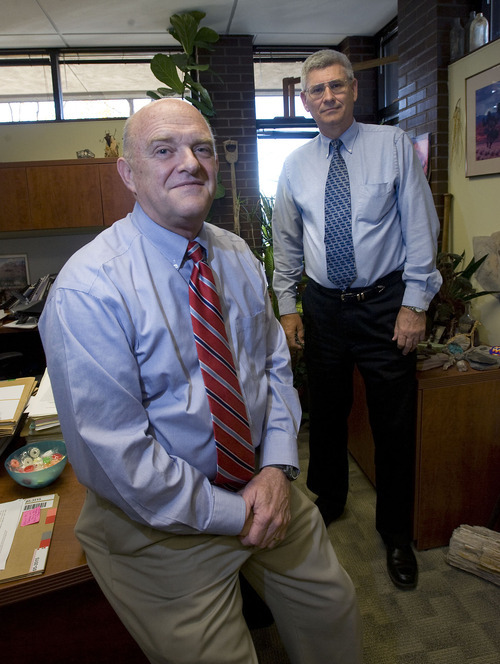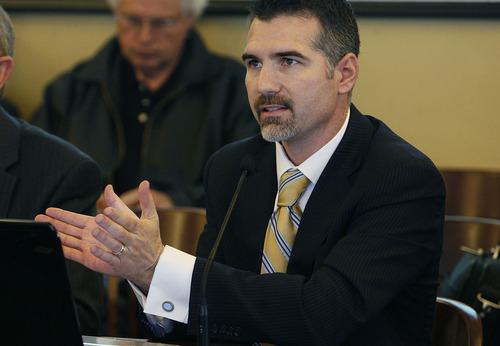This is an archived article that was published on sltrib.com in 2012, and information in the article may be outdated. It is provided only for personal research purposes and may not be reprinted.
A company once touted as one of the main financial backers of Utah's first nuclear power plant is in big trouble with federal securities regulators.
The U.S. Securities and Exchange Commission has accused LeadDog Capital and its principals of scamming investors. LeadDog was named as the source of $30 million in financing for Blue Castle Holding's proposed 3,000-megawatt nuclear power plant near the Green River.
Blue Castle CEO Aaron Tilton said his company had an agreement with the New York-based hedge fund for the working capital but he never pulled the trigger on the deal and no longer has dealings with LeadDog.
Still, the claimed $30 million in backing by LeadDog played a significant role in the state's controversial decision last week to grant rights to Blue Castle for 53,600 acre-feet of water from the Green River, water the nuclear power plant must have to operate its two planned reactors. The decision is expected to be the only official say the state has over the project, which must win approval of the U.S. Nuclear Regulatory Commission.
State Engineer Kent Jones certified among other things in his Jan. 20 decision that the company "has the financial ability to complete the proposed" project.
Jones said Thursday he was unaware of the SEC cease-and-desist action against LeadDog, but said he may have signed off on the application anyway.
"It would be my guess [Blue Castle] would have explained, 'We will go to somebody else to get money lined up,' and that probably would have been reasonable enough for us," Jones said.
"It was just a plan presented by them, and we didn't do a lot of investigation into the plan, about the validity of the plan," he added. "But it was their explanation for what they were going to do to obtain funds. Whether they had it in pocket or not, that was their explanation, and that explanation appeared to be a reasonable business practice."
In its cease-and-desist petition against LeadDog filed on Nov. 15, the SEC accuses the "purported hedge fund" and co-owners Chris Messalas and Joseph LaRocco of raising money from investors without disclosing the company's true financial position and conflicts of interest.
In July 2010, the company claimed $4.25 million in assets under management, the SEC filing alleged, while eight of the primarily penny-stock companies LeadDog had invested in were illiquid, and most were reporting losses of between $70,000 and $4 million.
That was a month after Blue Castle issued a news release touting the $30 million in private equity funding from LeadDog.
The SEC had no comment beyond its filing, and a phone message left at LeadDog's Wall Street office was not returned.
Tilton said Thursday he was unaware of LeadDog's problems but added that he never executed the financing agreement. "I guess it's a good thing that we didn't do business with them," he said. Meanwhile, he stressed that the project has plenty of funding from other sources, including its Willow Creek LLC, a pipeline subsidiary.
He didn't inform the state engineer that the LeadDog agreement never was completed, he said, insisting it would have been illegal for him to disclose to anyone — including the state — details about Blue Castle's funding arrangements. "We had many sources of revenue — some that came through and some that didn't."
Tilton said all Blue Castle was required to do was give the state a "reason to believe" that the company could finance the project, which is expected to cost around $100 million to license and as much as $18 billion to build.
Utah law spells out the state engineer's criteria for granting a water-rights change application. Most considerations have to do with the availability of water and the beneficial use of the water — a resource considered as valuable as gold in the West. But there also are financial considerations.
The engineer must determine that "the proposed plan is physically and economically feasible," that the applicant "has the financial ability to complete the proposed works; and [that] the application was filed in good faith and not for purposes of speculation or monopoly."
Jones, in his recent approval, said Blue Castle "has demonstrated to the satisfaction of the State Engineer an ability to secure funding as needed, on a step-by-step basis, and a plan to continue to capitalize the project sufficient to establish a reason to believe that the applicant has the ability to complete the works."
To support that conclusion, he noted in his decision that Blue Castle "submitted information indicating it has entered into an agreement with LeadDog Capital L.P. for private equity financing to provide up to $30 million in capital in exchange for Blue Castle common stock."
"The State Engineer," said Sarah Fields, program director of the anti-nuclear Uranium Watch in Moab, "did not properly investigate [Blue Castle] claims regarding the financial arrangements and utility commitments to the project."
Uranium Watch, along with more than 200 other groups, individuals and government agencies, protested the water rights change applications, with many of them questioning the finances.
Jones previously told The Tribune that he has no one on staff qualified to perform detailed financial investigations and that he did not believe he was required to bring in an expert to perform such a review. Financial scrutiny of the project will come from the NRC, he explained.
It is not clear whether the SEC's cease-and-desist action will prompt anyone to request a reconsideration of the water-rights change.
Jones said no one has requested the opportunity to present any new information about the license application so far, but there are still two weeks left to file such a request.
In addition, anyone who objects to the license will have an opportunity to appeal the decision in state court, he said.
"There's no doubt someone will request reconsideration," said Matt Pacenza, of the Healthy Environment Alliance of Utah. "The weakest part of the state engineer's decision by far is the part where he determined this is a reasonable plan to fund the project. It's alarming that Blue Castle is not only refusing to tell Utahns how it plans to make this happen, but apparently also not telling the state engineer."
Twitter: @judyfutah





